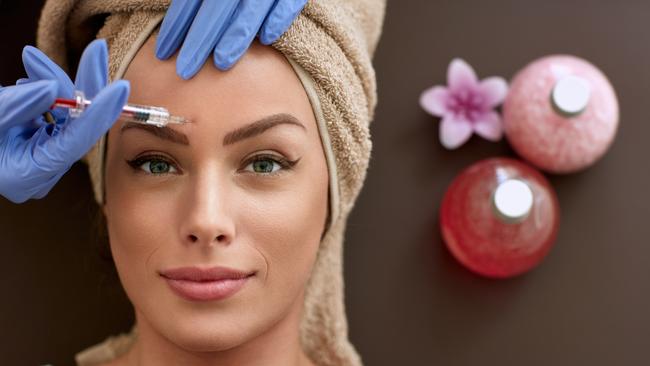Longer young women deactivate from Insta, TikTok, the better their wellbeing: Griffith University study
Social media suggestions that cosmetic procedures will make you feel good about yourself and be able to deal with the world in a better way are untrue, says a Queensland expert.
QLD News
Don't miss out on the headlines from QLD News. Followed categories will be added to My News.
A landmark Queensland study has revealed the powerful impacts of a social media detox on young women, including a marked improvement in their wellbeing and body image.
The research, revealed exclusively by The Courier-Mail, shows getting off social media, even for a short period, has a positive influence on how females aged 17-35 feel about themselves.
Psychology lecturer Veya Seekis, who led the study at Griffith University, says social media can trick women into thinking their appearance is all that matters.
“When they hop on social media, they see curated images that are filtered and enhanced with hashtags such as #bodypositivity, which comes across as some kind of empowerment for women,” Dr Seekis says.

“This or that cosmetic procedure is going to make you feel good about yourself and be able to deal with the world in a better way – both of which are untrue.”
In the study, 175 young women aged 35 and under were evaluated using three types of detoxes: seven days without Instagram and TikTok; a 30-minute daily time limit across all photo-based social media apps; and cleansing appearance-focused content from their Instagram and TikTok feeds.
Overall, the cleanse condition yielded the best outcomes for appearance satisfaction, while the partial 30-minute detox positively impacted women’s wellbeing the most.
When compared to participants who continued their social media use as usual, all three groups recorded improved wellbeing.
“Complete deactivation from Instagram and TikTok was the hardest,” Dr Seekis says, “but we found that the longer they deactivate, the better their wellbeing.”

She says the study is the first of its kind to directly compare the three detox strategies, and cleansing feeds can help “rejig the algorithm” that responds to likes, comments, shares and views.
“When content promoting idealised appearance garners significant engagement, it is likely to be propagated to other young women as top-tier content, which may elicit emotional or evaluative responses from those who feel their appearance falls short in comparison,” she says.
Dr Seekis says it is imperative that young women take steps to “safeguard their body image and wellbeing”.
She says by extending time limits on social media platforms or implementing periodic partial detoxes, for example every two months, they might be more satisfied with their appearance.
“The likelihood is that restricted time spent on photo-based social media platforms prompts young women to be more discerning with their usage, avoiding aimless scrolling through feeds inundated with idealised imagery,” she says.
The study, in collaboration with the University of Sunshine Coast and Flinders University, will be submitted for peer review and published later this year.
Tips for a seven-day Instagram/TikTok cleanse
REMOVE 10-15 appearance-focused profiles from Instagram and/or TikTok accounts.
UNFOLLOW profiles: consider those most shown in your feed, hashtags, creators and businesses
AVOID the explore page on Instagram
CLICK “not interested” on appearance-focused content on TikTok.
Tips for a 7-day social media time reduction
ADD a 30-minute time limit on “screen time”
MOVE social media apps to a folder to avoid temptation.





